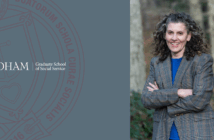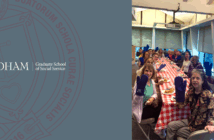Last month, the Graduate School of Social Service served as a sponsor for this year’s SWHELPER 2020 Anti-Racism Virtual Summit. The Summit took place over the course of two days, from 9 a.m. to 5 p.m.
During this time, speakers invited participants to examine social work through an anti-racist lens, and discuss social workers’ roles in the Black Lives Matter movement.
As one of the many benefits of sponsoring this summit, SWHELPER granted students and faculty at GSS free admittance to the 16 hours of crucial content. We asked members of the GSS Action Committee for Racial and Social Justice to highlight some of the most important things they took away from this experience.
Here’s what they had to say:
Binta Alleyne-Green, Ph.D., Associate Professor
Something that was really impactful to me isn’t necessarily something I learned per se, but seeing the recent statistics about the overwhelming number of children of color in foster care is so jarring to me. Learning about the UpEnd movement and the work that’s being done to dismantle the child welfare system is encouraging. And it’s important that we at GSS train our students and prepare them to be on the frontline of these systematic changes.
Sameena Azhar, Ph.D., Assistant Professor
For many years, I thought my experiences of being marginalized within social work academia were unique to me. But the summit helped articulate how racism has, in many ways, been endemic to social work education since the very origins of our profession. Recognizing and holding the field accountable for these racist histories and ongoing tensions is an important first step to creating more equitable spaces within social work.
Some of the ways that social work schools can confront these racist histories is by ensuring that anti-racist content is infused into our curricula; that faculty and students of color are recruited and provided guidance in terms of academic progress, graduation, tenure and promotion; and that marginalized communities are prioritized for scholarship and fellowship opportunities.
Tessa Engel, MSW ’20
I wasn’t able to attend all of the Summit, but perhaps the thing I reflected most upon was the myriad ways that the profession of Social Work itself upholds and perpetuates white supremacy. I’ve forced myself to consider how various facets of social work (juvenile justice, foster care, white school social workers working in schools with primarily BIPOC students, social workers collaborating with the police, and more) need to have a deep reckoning about how to properly address and dismantle white supremacy.
I also reflected on just how white-washed the social work curriculum is (at Fordham and in general), and how the field of mental health and psychotherapy in general is dominated by white scholars and white voices. I want to elevate and learn from BIPOC individuals and communities doing this work, and I wish for it to be incorporated into the core curriculum of all social work programs by the CSWE.
Overall, I will carry these reflections as a new MSW as I continue to engage in the field and with different communities during my professional trajectory.
Abby Ross, Ph.D., Assistant Professor
I am grateful to Dean McPhee for providing an opportunity for GSS students, staff, faculty and administration to attend the Anti-Racism Virtual Summit. SWHELPER pulled together a wide array of fantastic panelists who do not always have their voices centered — much less heard at all. We need more of this. My main take away from this Summit is that there is a glaring need for social work to play a critical role in dismantling white supremacy across all of our systems — health, social service, education, criminal justice, child welfare– just to name a few. To do this, we must reckon with our own professional history and make some serious changes to the aspects of our practice that are complicit in white supremacy and function to perpetuate existing inequities that have only been magnified by the COVID-19 pandemic. I am inspired by the work of so many social workers involved in this collective endeavor, and am excited that the newly formed GSS Action Committee for Racial and Social Justice can function as one mechanism to bring the GSS community together to do this work.
Anneliese Saltarelli, 2nd Year MSW Student
For context, the sessions I attended were:
- Social Work’s Role in Black Lives Matter
- Racism in Child Welfare
- A Chance in the World
- Developing Empathy & Understanding for the Trauma, Grief, and Loss of Families Impacted by Violence
All of the sessions were great, and each one was unique and rich in information and personal experience. I loved how the sessions were centered around the one common theme. Each speaker brought their individual experience to the table and shared their personal stories about growing up, working, and/or living in this world.
It was powerful listening to Eric Garner’s mother and sister speak about their experience following the loss of their son and brother Eric. I had not previously looked at who was speaking at that session and was taken aback when I realized who the main speakers were. I was grateful and moved by the fact that Eric’s mom and sister took time out of their days to help us understand their grief and trauma and share the importance of empathy.
At one point in the session, Eric’s mother shared a petition with everyone watching the session. She had created a petition to make September 15th Eric Garner Day in their city and state. It struck me how they turned such a tragedy into a celebration of Eric’s life and a fight for justice. One quote that stuck with me was when Eric’s mother said, “I decided to get up and turn my mourning into a movement and turn my sorrow into a strategy.”
I also enjoyed listening to the “A Chance in the World” session, where the speaker told us about his experience growing up in the foster care system. He shared his story and took us step by step through his childhood and adolescent years in the foster care system, and emphasized how one adult made a real difference in his life. As a budding social worker, this speech gave me hope! He went on to write a book about his experiences, which I would love to read someday. He was an incredible, empowering speaker!
Kimberly Hudson, Ph.D., Assistant Professor
What struck me most about the Virtual Summit, and what has continued to stay with me in the weeks since, is the power of storytelling, of telling our difficult truths. Charity Chandler-Cole took us, her audience, on a journey, weaving together her personal experiences with a critical analysis of various systems in her talk on racism in child welfare, imprinting on our hearts and minds a vision of justice so clear and so urgent.
If you are a member of the GSS community who attended the Summit and would like to contribute to this article, please write your response in an email and send it to cwhite53@fordham.edu.



